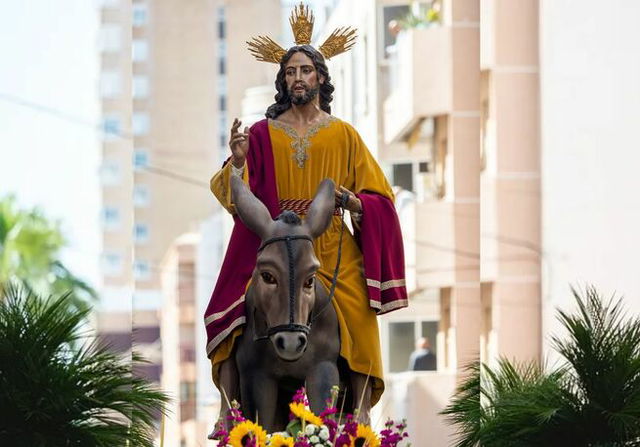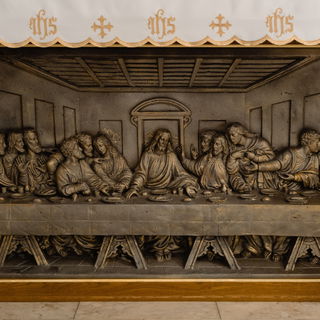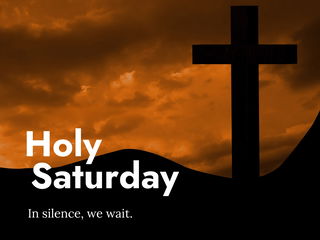- Calendar
- Calendar 2025
- April
- Palm Sunday
Palm Sunday
Palm Sunday, which takes place on the Sunday before Easter, is a significant day in the Christian Calendar and marks the beginning of the Holy Week.
Palm Sunday is a moveable feast, which means the date changes every year. Also known as Passion Sunday, this has rich symbolism, traditions, and deep spiritual meaning as it commemorates Jesus Christ's arrival at the city of Jerusalem as told in the Bible in all four gospels: Matthew, Mark, Luke, and John.
Palm Sunday is named because people in the Bible welcomed Jesus by waving palm branches when he entered Jerusalem.
The final part of Lent in Western Christianity begins with Palm Sunday, a time of serious reflection and preparation. In the East, Holy Week is preceded by a longer period of Lent.
Jesus's Arrival In Jerusalem
Jesus’ arrival in Jerusalem marks a significant and unforgettable event in the history of Christianity, and is mostly known as the Triumphal Entry.
As per the Gospels in the New Testament of the Bible, especially in Matthew 21:1–11, Mark 11:1–11, Luke 19:28–44, and John 12:12–19, the story is:
While Jesus approached Jerusalem, he sent two of his disciples ahead and instructed them to find a colt tied to a donkey in a nearby village and asked them to bring the animals to him.

The fulfillment of a prophecy from Zechariah 9:9, the Old Testament, emphasized Jesus’ down-to-earth arrival riding on a donkey as a symbol of peace.
The disciples followed Jesus’ instructions and placed their cloaks on the colt so that Jesus could ride the colt. As Jesus entered Jerusalem, he was welcomed by a large crowd who spread their cloaks on the road and waved palm branches, shouting “Hosanna!”
This term is an expression of praise, meaning “Save us, we pray!” The people hailed Jesus as the Son of David, acknowledging him as a long-awaited king and Messiah.
In the ancient world, palm branches were used to symbolize victory and peace and thus, by waving the palm branches, the crowd welcomed Jesus as a hero who would bring peace and salvation into the world.
Although the crowd was happy when Jesus entered Jerusalem with palm branches, this event started an important journey. It led to Jesus being arrested, put on trial, and crucified on Good Friday.
After that came the Last Supper and, finally, his Resurrection on Easter Sunday. This significant moment in Christian belief shows that from the happy entry, there was a deeper story leading to the core celebration of Christianity, Easter.
History of Palm Sunday Celebrations
The earliest recorded celebration of Palm Sunday is in the Peregrinatio Etheriae (The Pilgrimage of Egeria), a fourth century diary of a pilgrimage to the holy land.
In this account the writer recalls the events of Holy Week (or 'Great Week' as it is referred to) and on Palm Sunday describes a vigil and a reenactment of the procession from the Mount of Olives to the city.
Other early mentions of Palm Sunday celebrations are included in the Bobbio Missal, a book found in Italy in 1686 which contains the lectionary from seventh century masses including Palm Sunday.
How Palm Sunday is celebrated now
During a traditional Palm Sunday service, palm branches are distributed to the congregation and blessed by the priest. Children might make palm branches in Sunday school and wave them, too. Some churches hold reenactments of Jesus' arrival in Jerusalem by placing clothes on the floor of the church and having a member of the congregation play the role of Jesus coming on a donkey.
Palm branches are often taken home, sometimes instead of branches, crosses made out of palm leaves are distributed to the congregation and taken home. People will hang their branches up in their houses to remind them of Holy Week and Jesus all year round.
Traditionally, these palm branches or crosses would be burned the following year and the ashes from the branches would then be used to draw crosses on the heads of the congregation on Ash Wednesday.
Many countries host big processions portraying the Passion of Christ. Palm Sunday, like all days during Holy Week, is a day for Christians to reflect on the significance of the sacrifices that Jesus made for them.
Click here to learn more about Holy Week and the other special days that lead up to Easter.
McGowan, A., & Bradshaw, P. F. (2018). The pilgrimage of Egeria: a new translation of the Itinerarium Egeriae with introduction and commentary. Liturgical Press.
Hen, Y., & Meens, R. (Eds.). (2004). The Bobbio Missal: Liturgy and Religious Culture in Merovingian Gaul (Vol. 11). Cambridge University Press.

Other Celebrations
-
Apr 20 Sun
-
Apr 21 MonEaster Monday Holiday
-
Jun 15 Sun
-
Oct 05 Sun
-
Feb 18 Wed
-
Mar 15 Sun

Palm Sunday - Next years
Sunday, 29 March 2026
Sunday, 21 March 2027
Sunday, 09 April 2028
2025 Calendars
You might also be interested in











